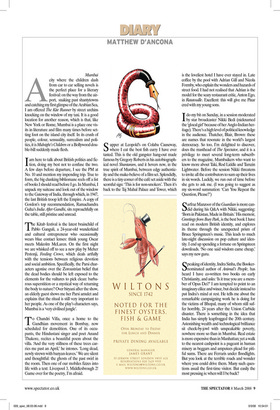Mumbai A city where the children dash from car to car
selling novels is the perfect place for a literary festival: on the way from the airport, snaking past shantytowns and catching my first glimpse of the Arabian Sea, I am offered The Kite Runner by street urchins knocking on the window of my taxi. It is a good location for another reason, which is that, like New York or Rome, Mumbai is a place one visits in literature and film many times before setting foot on the island city itself. In its crush of people, colour, sensuality, surrealism and politics, it is Midnight’s Children or a Bollywood double-bill suddenly made flesh.
Iam here to talk about British politics and fiction, doing my best not to confuse the two. A few days before departure, I see the PM at No. 10 and mention my impending trip. True to form, the big clunking bibliomane reels off a list of books I should read before I go. In Mumbai, I unpack my suitcase and look out of the window to the Gateway of India, through which, in 1947, the last British troop left the Empire. A copy of Gordon’s top recommendation, Ramachandra Guha’s India After Gandhi, sits reproachfully on the table, still pristine and unread.
The Kitab festival is the latest brainchild of Pablo Ganguli, a 24-year-old wunderkind and cultural entrepreneur who occasionally wears blue contact lenses: think young Oscar meets Malcolm McLaren. On the first night we are whisked off to see a new play by Meher Pestonji, Feeding Crows, which deals artfully with the tensions between religious devotion and social ambition. Specifically, the Parsi characters agonise over the Zoroastrian belief that the dead bodies should be left exposed to the elements for the vultures to pick clean: barbarous superstition or a mystical way of returning the body to nature? Over biryani after the show, an elderly guest shows me her Parsi amulet and explains that the ritual is still very important to her people. As one of the play’s characters says, Mumbai is a ‘very civilised jungle’.
To Chandri Villa, once a home to the Gandhian movement in Bombay, now scheduled for demolition. One of its occupants, the Hindustani singer and poet Anand Thakore, recites a beautiful poem about the villa. ‘And the very stillness of these trees carries me past an April,’ he intones. ‘Long dead, newly strewn with banyan-leaves.’ We are silent and thoughtful: the ghosts of the past swirl in the room. Then one of our mobiles fizzes into life with a text: Liverpool 3, Middlesbrough 2! Game over for the poetry, I’m afraid. Supper at Leopold’s on Colaba Causeway, where I eat the best fish curry I have ever tasted. This is the old gangster hang-out made famous by Gregory Roberts in his autobiographical novel Shantaram, and it hovers now, in the true spirit of Mumbai, between edgy authenticity and the make-believe of a film set. Splendidly, there is a tiny corner of the café set aside with the scornful sign: ‘This is for non-smokers’. Then it’s Wiltonsspec09.04.05qxd 5/4/05 back to the Taj Mahal Palace and Tower, which is the loveliest hotel I have ever stayed in. Late coffee by the pool with Adrian Gill and Nicola Formby, who explain the wonders and hazards of street food. I had not realised that Adrian is the model for the scary restaurant critic, Anton Ego, in Ratatouille. Excellent: this will give me Pixar cred with my young sons.
Ido my bit on Sunday, in a session moderated by star broadcaster Nikki Bedi (nicknamed the ‘glocal girl’ because of her Anglo-Indian heritage). There’s a high level of political knowledge in the audience. Thatcher, Blair, Brown: these are names that resonate in the world’s largest democracy. So too, I’m delighted to discover, does the masthead of The Spectator, and it is a privilege to meet several long-term subscribers to the magazine, Mumbaikers who want to know more about Taki, Rod Liddle and Tamzin Lightwater. Before the session Nikki threatens to invite all the contributors to sum up their lives in six words. Luckily, we run out of time before she gets to ask me. (I was going to suggest as :05 my six-word summation: ‘Can You Repeat the Question, Please?’) Sarfraz Manzoor of the Guardian is more candid during his Q&A with Nikki, suggesting: ‘Born in Pakistan, Made in Britain.’ His memoir, Greetings from Bury Park, is the best book I have read on modern British identity, and explores its theme through the unexpected prism of Bruce Springsteen’s music. This leads to much late-night discussion on pop culture and identity. I end up spending a fortune on Springsteen downloads. ‘No one said wisdom came cheap,’ says my new guru.
Speaking of identity, Indra Sinha, the Bookernominated author of Animal’s People, has heard I have co-written two books on early Christianity, and asks: ‘Is it true you are a member of Opus Dei?’ I am tempted to point to an imaginary cilice and wince, but decide instead to put Indra’s mind at rest. He tells me about the remarkable campaigning work he is doing for the victims of Bhopal, many of whom still suffer horribly, 24 years after the Union Carbide disaster. There is something in the idea that India has simply leapfrogged the 20th century. Astonishing wealth and technological brilliance sit cheek-by-jowl with unspeakable poverty, nowhere more so than in Mumbai. Real estate is more expensive than in Manhattan; yet a walk to the nearest cashpoint is a pageant in human misery as beggars and amputees plead for pitiful sums. There are Ferraris under floodlights. But you look at the terrible roads and wonder where you could drive them. Many such questions assail the first-time visitor. But easily the most pressing is: when will I be back?


















































































 Previous page
Previous page